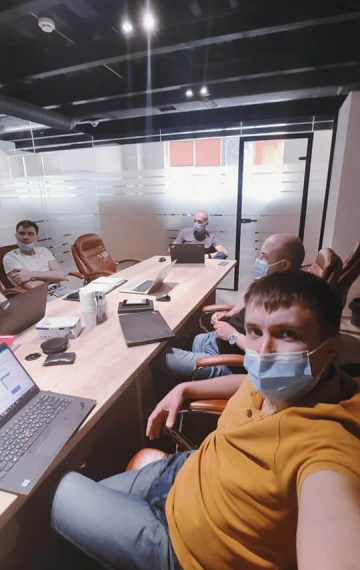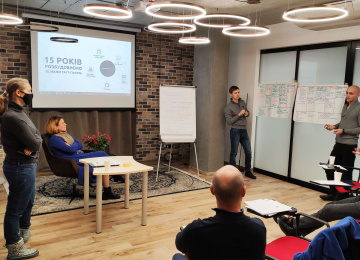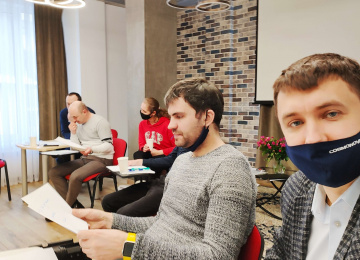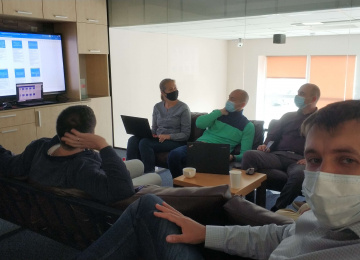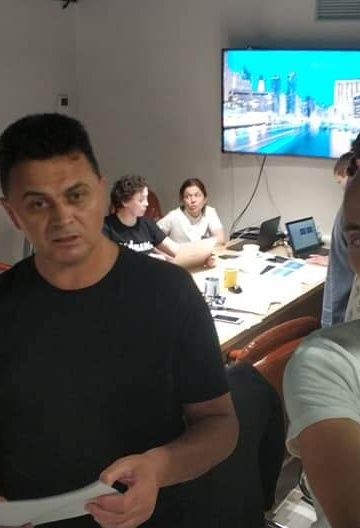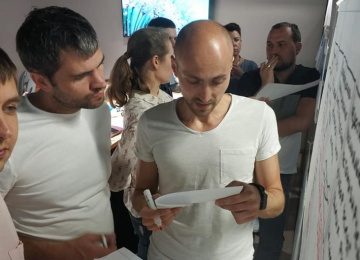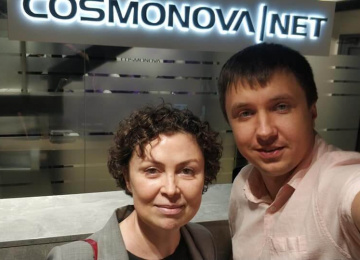
The success story of COSMONOVA|NET, an innovator on the Ukrainian IT market.
Today, the Internet is something many of us simply can’t do without. If you need some information, just take out your smartphone and it’s at your fingertips.
According to studies, more than two-thirds of Ukrainians have access to Internet, and use it on a regular basis. Many of us use it to make a living. In some countries, having access to the Internet is increasingly being seen as a right that all should have.
During the recent COVID-19 pandemic, the Internet allowed people to keep their jobs by working from home, remain in touch with friends and relatives they couldn’t meet in person, and maintain their health and sanity by having access to information and advice at all times.
In wartime Ukraine, the Internet has the added function of providing secure military communications, via the ultra-modern Starlink satellite-based system provided by U.S. company SpaceX.
Just 20 years ago, easy access to the Internet for all was just a dream. However, for some people, it has been their business to make that dream a reality.
Internet for Neighbours
One of them is Maxim Syomochkin, the director of COSMONOVA|NET. His company now is one of the largest Internet providers in Ukraine. But in 2004, when he and his friend started the business as their first job after university, it was just a small design studio.
At that time, almost no one knew about Internet provision via fiber-optic cables – which now reaches into homes all across Ukraine. If you wanted to get onto the Internet, most likely you used a computer with a modem, plugged into a regular phone line. It was slow, unreliable, and expensive.
The old dial-up modems began to be replaced by Digital Subscriber Lines, or DSL technology, which used dedicated phone lines that could transmit much larger amounts of information much more quickly – the first broadband services.
Syomochkin decided he needed DSL for his office, which was located in a residential building. And neighbours being neighbours, they also wanted to find out more about this new technology.
"A dedicated line with Internet access cost crazy money at the time – about $300 a month for a channel up to 2 Mbps (megabits per second, today data channels of 50-100 Mbps are common even for home use),” Syomochkin says.
“While we were constructing the line, our neighbours began to ask: ‘What are you doing? We want one too!’ We explained how it worked, but at that moment hadn’t come up with the idea (of sharing the line). But after discussions with the management (of the Internet provider), we decided to share the channel between residents and reduce the cost of its maintenance.”
That’s how COSMONOVA|NET started out as an Internet provider. In a month, they had connected about twenty neighbouring apartments to their network.
Fast forward to today, when the company provides its services in more than 80% of all new buildings in Kyiv and Kyiv Oblast.
“In B2C, we’re focused precisely on this market,” Syomochkin says. “We work in apartment buildings and residential complexes that were put into operation no more than three years (ago).”
“While in B2B, we’re building our telecom networks in business concentration areas – from office buildings to business centres. We actually now (have a presence) in the entire capital and the region. The length of our fibre optic network is more than seven hundred kilometres.”
Innovative offers for corporate clients
As Internet technologies developed, the company began to implement large-scale projects, entirely new to Ukraine at the time, on the B2C and B2B markets.
In 2008, the company started to offer IP-telephony solutions to corporate clients, and in 2010 the company built and opened its own data centre. Subsequently, the centre in Ukraine has become home to a cloud platform, and after a while the company launched a similar platform in Europe.
“We’re simultaneously developing different areas of our activity: data centre, cloud solutions, IP signal processing and transmission, online Internet broadcasting, IP telephony for business subscribers, Internet and IPTV services for home users,” says Syomochkin. “We’re also developing our own software and provide international IT consulting. For our partners, we are a multi-service operator that provides the full range of telecommunication services on our own.”
How to make a company more efficient
But after a time, all that rapid growth came at a cost to efficiency, says the director of COSMONOVA|NET. His company needed to encourage more efficiency and reorganize its internal processes:
“Everyone wanted to grow. Not just organically, as it was before, but at a breakneck pace,” says Syomochkin.
“But there was no awareness about what exactly we needed to change in order to develop more rapidly.”
Help arrived in the form of the advisory project on Organizational Development for System Organization and Strategy under the European Bank for Reconstruction and Development’s SME support programme and funded by the EU4Business. As part of the initiative, Syomochkin’s company was provided with business consultants, who analysed its organizational structure in connection to the business model and helped determine the ideal vectors for development.
Early on, COSMONOVA|NET set itself several tasks: to focus its team, form a market strategy, and align it with its business model. They also sought to transfer the operational management of the company from its owners to a management team – creating a professional team that could implement the market strategy.
The consultants worked with the business for more than half a year, taking necessary precautions but not stopping even during the coronavirus pandemic. During this time, Syomochkin says, they managed to form a clear strategy and mission for the company's development, and to optimize its work.
"With the help of consultants, the maturity of our top management team has increased,” Syomochkin says.
“The consultants asked us the ‘right’ questions and encouraged to think from a different angle. The level of communication has grown, because everyone felt responsible not only for their own performance, but also for the company’s.”
As a result, the company’s key performance indicators started to grow: Its subscriber base in B2C from 2019 to 2021 grew by 85%, and in B2B by almost 40%. Subscriber coverage increased by 65%. The company’s customer loyalty index also grew.
And this year, despite the war in Ukraine, the company presented its products and services at the International Broadcasting Convention (IBC 2022) exhibition in Amsterdam – the world’s largest telecommunications exhibition.
COSMONOVA|NET now plans to apply to take part in the EU-supported programs again. Following the experiences of the pandemic and now war, the goal this time is to switch the company to a hybrid work format – part on site and part remote working, while at the same time maintaining the level of team efficiency.
And as Internet technology develops further, the company plans to stay at the forefront of developments – with the help of EU4Business and the EBRD.

